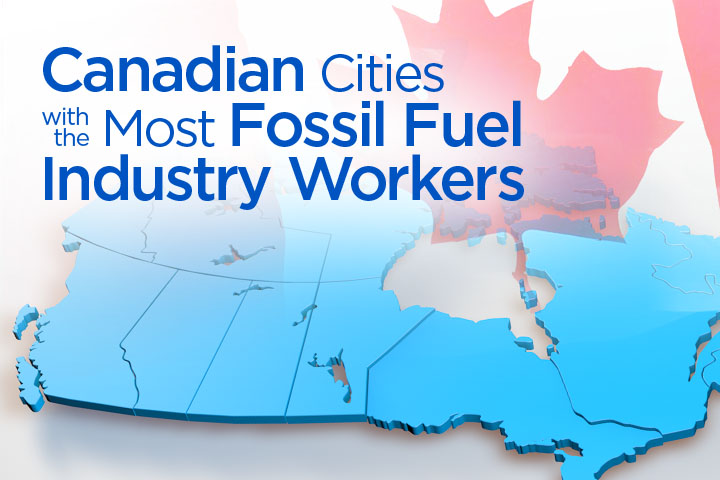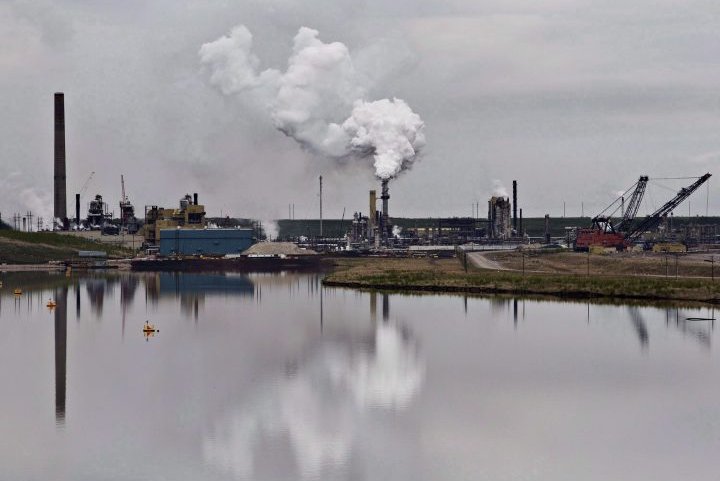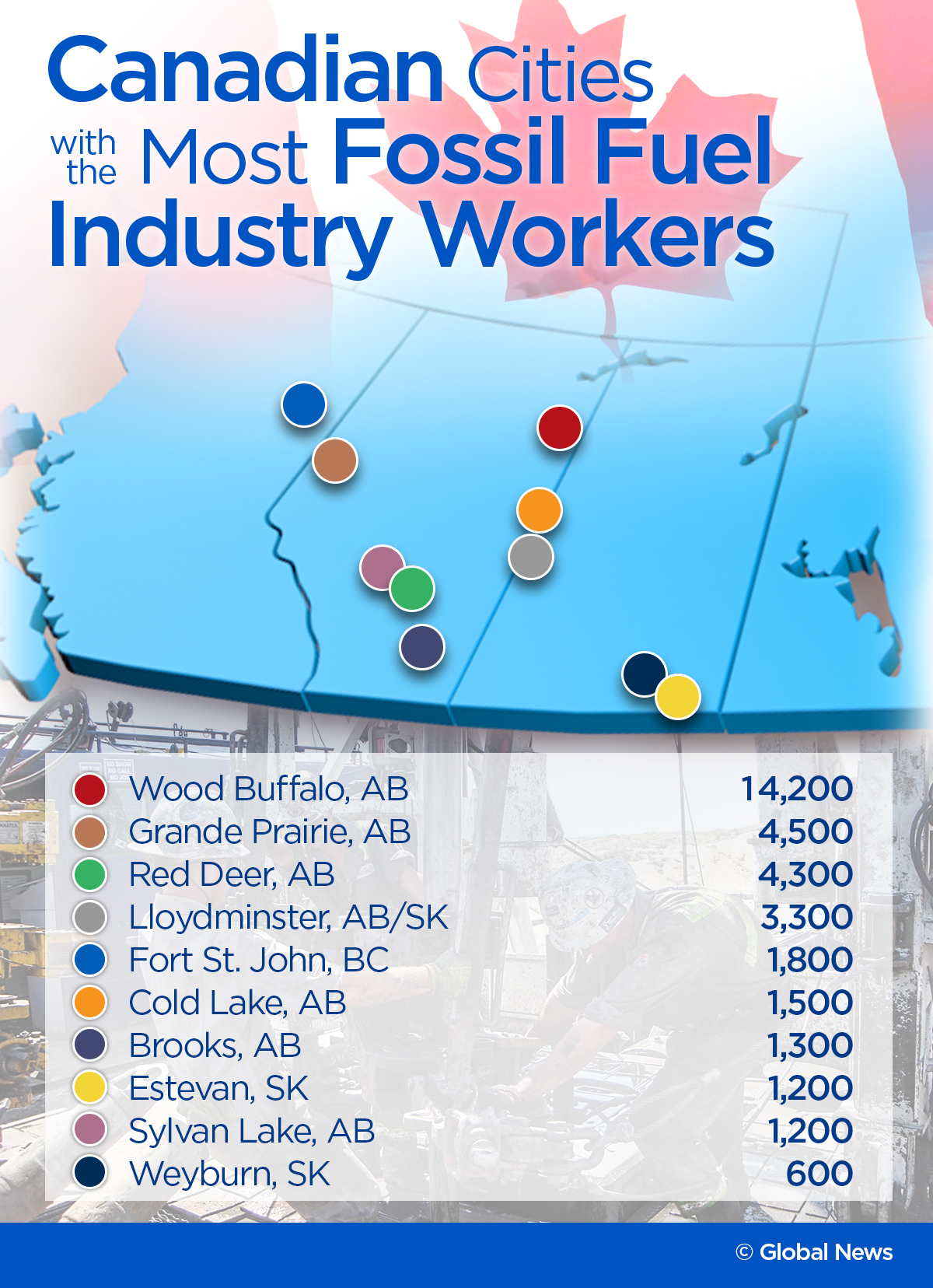For Canada to transition to a clean economy, it has to leave fossil fuels behind. And certain parts of the country will have a harder time than others, according to a report from the Canadian Centre of Policy Alternatives.

SIGN UP FOR ERICA ALINI’S UPCOMING WEEKLY MONEY NEWSLETTER:
“Making decarbonization work for workers,” which highlights how the transition can be done relatively smoothly, names cities in Canada that have the highest number of fossil fuel workers.
WATCH: Coal power starts going offline in Alberta as shift to cleaner energy picks up

For example, Wood Buffalo, Alta., — a region which includes Fort McMurray — has 14,200 workers in the fossil fuel industry.
Hadrian Mertins-Kirkwood, the author of the report, told Global News that other workers in the area are also heavily involved.
“The whole area is almost entirely dependent on the oil industry,” he said.
The map below illustrates the cities with the highest share of workers in fields directly related to the fossil fuel industry. A large percentage of these cities’ workforces are directly employed in such jobs.
READ MORE: Fossil fuels ‘probably dead,’ says Canadian Pacific Railway CEO
More than 31 per cent of Wood Buffalo’s workforce is part of the industry.
The second highest concentration of fossil fuel workers is in Cold Lake, Alta., at 16.7 per cent, followed by Lloydminster, Alta./Sask., (16.5 per cent), Estevan, Sask., (15.2 per cent), Sylvan Lake, Alta., (14.2 per cent), Grande Prairie, Alta., (12 per cent), Weyburn, Sask., (10.7 per cent), Fort St. John, B.C., (10.4 per cent), Brooks, Alta., (10 per cent), and Red Deer, Alta. (7.5 per cent).
Here the cities with the highest share of fossil fuel employees in their workforce:
Who is most likely to be affected
While oilsands, specifically the ones in Alberta, are most affected and discussed, Mertins-Kirkwood said other parts of the country will also face heat during the switch.
“The oil industry is not only limited to Alberta. For example, we talked briefly in the report about Sarnia, Ont.,” he says, adding there are pockets of the industry all over Canada.
He said several other industries, such as construction, electricity and the auto sector, are heavily intertwined with fossil fuel related jobs and will also have to evolve.
“This is by no means an Alberta-specific problem or a Western Canada-specific problem.”
WATCH: How does Trump’s decision to pull out of the Paris Climate Accord affect Canada?

Making the transition
Canada has made international commitments, such as the Paris climate accord, to reduce its greenhouse gas (GHG) emissions. The country has also pledged to reduce GHG emissions by 80 per cent by 2050.
To meet those targets, the government has to abandon fossil fuels, Mertins-Kirkwood’s report says.
READ MORE: Alberta to expand airborne monitoring of oilsands greenhouse gas emissions
“We have a national coal phase out, which basically means by 2030, there will not be coal fired electricity in Canada, with some small exceptions,” he explains.
But he adds that there is no timeline in Canada for an oil phase out, and it’s impossible to know how long one would take. But it needs to happen if the 2050 goals are to be met.
“You can’t wait a few decades to get started. This really is a process that has to start now. It had to start 20 years ago.”
What happens to people employed by fossil fuel jobs
With this impending phase out, what happens to those who are employed in fossil fuel industry jobs?
University of Calgary public policy researcher Kent Fellows told Global News that the transition to a clean economy will be slow enough that it will be fairly smooth.
“The carbon tax comes in, and other emissions policies come in, and we’re expecting a transformation that’s going to take decades,” he explained.
He said the oilsands have seen hard times with fluctuating oil prices, and the effects of such changes will be less dramatic in the short term.
WATCH: Notley takes shot at both environmentalists and climate change deniers

Fellows gave the example of other industries that have been phased out over time.
“We didn’t worry about supporting people who were part of the horse and carriage industry, because that transition happened slowly enough that you had retirements. You don’t replace them, and then people entering the job market pick different sectors,” he said.
READ MORE: Here are the jobs with the highest — and lowest — wage growth in Canada
While this helps, there will still be many workers who will have to switch fields or move away from oilsands-dependent regions to find jobs.
It will be a challenge, Mertins-Kirkwood says, adding there are ultimately two things that can help ease the transition — “social support and job creation measures.”
WATCH: ‘You’re in Alberta now’ anger rises over Trudeau’s comments on Alberta oilsands

The first means better government, and longer support for workers facing unpredictable job situations.
“If you’re a worker and you lose your job and you get weeks of income support, that’s not enough time to go back to school and learn new skills or to move your family,” he says.
And the second involves the government investing in the areas where the economy will be harmed by the switch to clean energy.
“If the government is going to create a huge new solar facility in Alberta, why not put it in Fort McMurray?” he suggests.
- Small grocers, co-ops receiving boost from Loblaw boycott: ‘A lot of anger’
- U.K. bans generic passwords over cybersecurity concerns. Should Canada be next?
- Overwhelmed with spam texts? Stats show the problem is getting worse
- How caregiving impacts a generation of Canadians: ‘Unpaid work does not end’








Comments